
The 560 series was the third and last series of Hewlett-Packard's Pocket PC format Jornada devices. It debuted in October 2001.

The 560 series was the third and last series of Hewlett-Packard's Pocket PC format Jornada devices. It debuted in October 2001.

| Model number | Part number | RAM | Developer software [1] |
|---|---|---|---|
| 564 | F2899A | 32MiB | |
| 565 | F1865A | 32MiB | Developer One Code Wallet, Developer One Access Panel software |
| 567 | F2921A | 64MiB | |
| 568 | F2915A | 64MiB | Developer One Code Wallet, Developer One Access Panel software |
The hardware used in the 560 series is very similar to that of the 7xx Jornadas, and also that of the Assabet development platform. [2]
There are three main hardware differences with the 7xx Jornadas. [3] The 7xx devices feature the following:
206 MHz Intel StrongARM SA-1110.
The 710, 720, 728, and 820 Jornadas also used this processor.
Epson 1356TM.
Philips UDA1345TS.
This is a low-power, single-chip Analogue-to-Digital Converter and Digital-to-Analogue Converter. It was designed for portable music devices and PDAs.
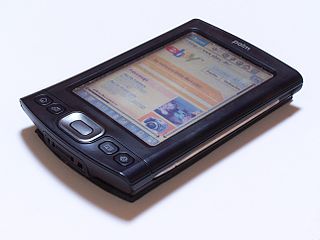
A personal digital assistant (PDA), also known as a handheld PC, is a variety mobile device which functions as a personal information manager. PDAs have been mostly displaced by the widespread adoption of highly capable smartphones, in particular those based on iOS and Android, seeing a rapid decline in use after 2007.

A Pocket PC is a class of personal digital assistant (PDA) that runs the Windows Mobile or Windows Embedded Compact operating system that has some of the abilities of modern desktop PCs. The name was introduced by Microsoft in 2000 as a rebranding of the Palm-size PC category. Some of these devices also had integrated phone and data capabilities, which were called Pocket PC Phone Edition or simply "Smartphone".

Palm is a line of personal digital assistants (PDAs) and mobile phones developed by California-based Palm, Inc., originally called Palm Computing, Inc. Palm devices are often remembered as "the first wildly popular handheld computers," responsible for ushering in the smartphone era.
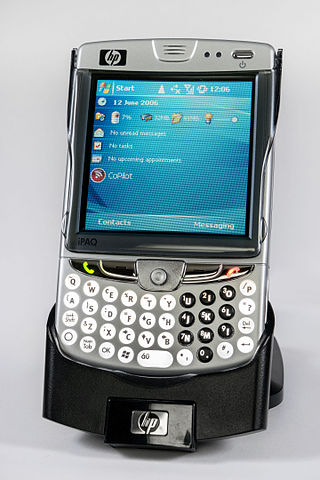
The iPAQ is a discontinued Pocket PC and personal digital assistant which was first unveiled by Compaq in April 2000.
Windows Embedded Compact, formerly Windows Embedded CE, Windows Powered and Windows CE, is a discontinued operating system subfamily developed by Microsoft as part of its Windows Embedded family of products.
Casio Cassiopeia was the brand name of a PDA manufactured by Casio. It used Windows CE as the Operating system. Casio was one of the first manufacturers of PDAs, developing at the beginning small pocket-sized computers with keyboards and grayscale displays and subsequently moving to smaller units in response to customer demand.
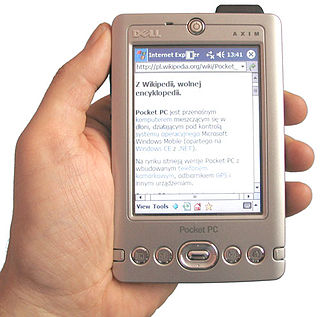
The Dell Axim family of personal digital assistants was Dell's line of Windows Mobile-powered Pocket PC Devices. The first model, the Axim X5, was introduced in 2002, while the final model, the Axim X51, was discontinued on April 9, 2007.

The MPC5xx family of processors such as the MPC555 and MPC565 are 32-bit PowerPC embedded microprocessors that operate between 40 and 66 MHz and are frequently used in automotive applications including engine and transmission controllers. Delphi Corporation use either the MPC561 or MPC565 in the engine controllers they supply to General Motors, with nearly all 2009 model GM North America vehicles now using an MPC5xx in the engine controller. Bosch also used the MPC5xx throughout the ME(D)-9 series of Gasoline Engine Controllers, EDC-16 series of Diesel Engine Controllers as did the Cummins B series diesel engine ECU.

A handheld personal computer (PC) is a pocket-sized computer typically built around a clamshell form factor and is significantly smaller than any standard laptop computer, but based on the same principles. It is sometimes referred to as a palmtop computer, not to be confused with Palmtop PC which was a name used mainly by Hewlett-Packard.

The Jornada was a line of personal digital assistants or PDAs manufactured by Hewlett-Packard. The Jornada was a broad product line that included Palm-Size PCs, Handheld PCs, and Pocket PCs. The first model was the 820, released in 1998, and the last was the 928 model in 2002 when Compaq and HP merged. The Jornada line was then succeeded by the more popular iPAQ model PDAs. All Jornada models ran Microsoft Operating Systems that were based on Windows CE.
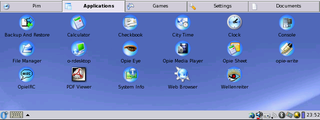
Jornada Linux Mobility Edition or JLime is a Linux distribution originally aimed for the HP Jornada platform. It was created in late 2003 by Kristoffer Ericson and Henk Brunstin. It is developed using the OpenEmbedded build system.
Xircom, Inc., was an American computer networking hardware and mobile technology company. Headquartered in Thousand Oaks, California, Xircom was one of the first companies to develop network computing products for notebook computers. Products included computer memory cards, LAN adapters, modems, and remote access server products. The company's products enabled notebook users to share information over a network connection.
Smartphone & Pocket PC was published every two months by Thaddeus Computing and covered Windows Mobile devices, software, and accessories. It included news, tips, articles, reviews, how-tos, and an enterprise section. Its headquarters was in Fairfield, Iowa.
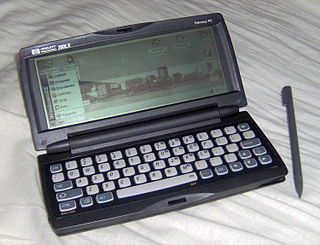
The HP 300LX was one of the first handheld PCs designed to run the Windows CE 1.0 operating system from Microsoft. Unlike other HPCs of the time, the resistive touch screen had an enhanced screen resolution of 640x240 with 4 shades of grey, rather than the standard 480x240 resolution of other devices, such as the Casio Cassiopeia A-10. The device also sported a full PC card slot, a serial link cable plug, and an infrared port.
The XDA Flame is a Pocket PC device first released in May 2007, produced by Arima Communications and originally distributed by O2 Asia Pacific & Middle East. This device belongs to a wide O2 Xda device family, including XDA Atom, XDA Atom Life, XDA Zinc, XDA Orbit, XDA Stealth, XDA II Mini, XDA IIs, XDA II and XDA. It is one of the first Pocket PC device that was enabled with 3D accelerated graphics nVidia's GoForce 5500 graphic processor (GPU). XDA Flame is also a 3G enabled phone with VGA touch screen, 2GB flash memory, 128MB RAM, Intel XScale PXA 270 520 MHz processor and integrated FM radio.

A Palmtop PC was an approximately pocket calculator-sized, battery-powered computer compatible with the IBM Personal Computer in a horizontal clamshell design with integrated keyboard and display. It could be used like a subnotebook, but was light enough to be comfortably used handheld as well. Most Palmtop PCs were small enough to be stored in a user's shirt or jacket pocket.

Imageon was a series of media coprocessors and mobile chipsets produced by ATI in 2002–2008, providing graphics acceleration and other multimedia features for handheld devices such as mobile phones and Personal Digital Assistants (PDAs). AMD later sold the Imageon mobile handheld graphics division to Qualcomm in 2009, where it was used exclusively inside their Snapdragon SoC processors under the Adreno brand name.

Pocket PC 2000 was the first member of the Windows Mobile family of mobile operating systems that was released on April 19, 2000, and was based on Windows CE 3.0. It is the successor to the operating system aboard Palm-size PCs. Backwards compatibility was retained with such Palm-size PC applications.
Pocket-sized computer describes the post-programmable calculator / pre-smartphone pocket-sized portable-office hardware devices that included the earlier DOS-based palmtops and subsequent Windows-CE handhelds, as well as a few other terms, primarily covering the 1980s through 2007.